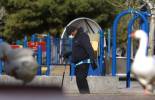‘Timid in the face of new challenges’
Last week, in response to Coercion-Schooling Secretary Arne Duncan's Aug. 8 announcement that he would encourage all 50 states to apply for waivers of testing requirements under the No Child Left Behind Act -- the secretary asserting such testing serves as an "impediment" and "disincentive" to what America's professional educrats are really supposed to be doing -- I promised to detail New York (city and state) Teacher of the Year John Taylor Gatto's assessment of what really goes on in the government schools, from his great book, "An Underground History of American Education."
Reading, spelling and arithmetic are only the "cover" curricula of these schools, Mr. Gatto explains, based on his years in the New York City public schools. Their more basic curriculum -- the one for which math and English tests form a mere distraction and "impediment" -- is built into their structure, and the way they structure a child's behavior.
"School wreaks havoc on human foundations in at least eight substantive ways so deeply buried few notice them, and fewer still can imagine any other way for children to grow up," Mr. Gatto explains.
Pressed for space, pardon me if for now I trim his list to five (the words that follow are Mr. Gatto's -- read the whole text at www.johntaylorgatto.com/chapters/15d.htm):
"1) The first lesson schools teach is forgetfulness; forcing children to forget how they taught themselves important things like walking and talking. This is done so pleasantly and painlessly that the one area of schooling most of us would agree has few problems is elementary school -- even though it is there that the massive damage to language-making occurs. ... If we forced children to learn to walk with the same methods we use to force them to read, a few would learn to walk well in spite of us, most would walk indifferently, without pleasure, and a portion of the remainder would not become ambulatory at all. ...
"2) The second lesson schools teach is bewilderment and confusion. Virtually nothing selected by schools as basic is basic, all curriculum is subordinate to standards imposed by behavioral psychology, and to a lesser extent Freudian precepts. ...
"Similarly, endless sequences of so-called 'subjects' delivered by men and women who, however well-meaning, have only superficial knowledge of the things whereof they speak, is the introduction most kids get to the liar's world of institutional life. Ignorant mentors cannot manage larger meanings, only facts. ... Schools teach the disconnection of everything. ...
"4) The fourth lesson schools teach is indifference. By bells and other concentration-destroying technology, schools teach that nothing is worth finishing because some arbitrary power intervenes both periodically and aperiodically. If nothing is worth finishing, nothing is worth starting. Don't you see how one follows the other? Love of learning can't survive this steady drill. Students are taught to work for little favors and ceremonial grades which correlate poorly with their actual ability. ...
"5) The fifth lesson schools teach is emotional dependency. By stars, checks, smiles, frowns, prizes, honors, and disgraces, schools condition children to lifelong emotional dependency. It's like training a dog. ...
"Each day, schools reinforce how absolute and arbitrary power really is by granting and denying access to fundamental needs for toilets, water, privacy, and movement. In this way, basic human rights which usually require only individual volition, are transformed into privileges not to be taken for granted.
"6) The sixth lesson schools teach is intellectual dependency. Good people wait for a teacher to tell them what to do. Good people do it the way the teacher wants it done. Good teachers in their turn wait for the curriculum supervisor or textbook to tell them what to do. ...
"For all its clumsy execution, school is a textbook illustration of how the bureaucratic chain of command is supposed to work. Once the thing is running, virtually nobody can alter its direction who doesn't understand the complex code for making it work, a code that never stops trying to complicate itself further in order to make human control impossible. The sixth lesson of schooling teaches that experts make all important choices, but it is useless to remonstrate with the expert nearest you because he is as helpless as you are to change the system. ...
"With these lessons in hand you should have less trouble seeing that the social pathologies we associate with modern children are natural by-products of our modern system of schooling, which produces:
"-- Children indifferent to the adult world of values and accomplishment, defying the universal human experience laid down over thousands of years that a close study of grown-ups is always the most exciting and one of the most necessary occupations of youth. Have you noticed how very few people, adults included, want to grow up anymore? Toys are the lingua franca of American society for the masses and the classes.
"-- Children with almost no curiosity. Children who can't even concentrate for long on things they themselves choose to do.
"-- Children with a poor sense of the future, of how tomorrow is linked to today. Children who live in a continuous present. Conversely, children with no sense of the past and of how the past has shaped and limited the present, shaped and limited their own choices, predetermined their values and destinies to an overwhelming degree. ...
"-- Children who can't stand intimacy or frankness. Children who masquerade behind personalities hastily fabricated from watching television and from other distorted gauges of human nature. Behind the masks lurk crippled souls. Aware of this, they avoid the close scrutiny intimate relationships demand because it will expose their shallowness of which they have some awareness. ...
"-- Dependent children who grow up to be whining, treacherous, terrified, dependent adults, passive and timid in the face of new challenges. And yet this crippling condition is often hidden under a patina of bravado, anger, aggressiveness. ... "
Does Mr. Gatto describe any young people you know? Any directionless young people rioting in England?
Vin Suprynowicz is assistant editorial page editor of the Review-Journal, and author of the novel "The Black Arrow" and "The Ballad of Carl Drega." See www.vinsuprynowicz.com.






















